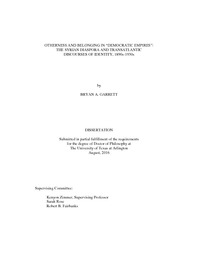
ATTENTION: The works hosted here are being migrated to a new repository that will consolidate resources, improve discoverability, and better show UTA's research impact on the global community. We will update authors as the migration progresses. Please see MavMatrix for more information.
Show simple item record
| dc.contributor.advisor | Zimmer, Kenyon | |
| dc.creator | Garrett, Bryan A. | |
| dc.date.accessioned | 2016-10-25T20:15:23Z | |
| dc.date.available | 2016-10-25T20:15:23Z | |
| dc.date.created | 2016-08 | |
| dc.date.issued | 2016-08-15 | |
| dc.date.submitted | August 2016 | |
| dc.identifier.uri | http://hdl.handle.net/10106/26154 | |
| dc.description.abstract | This dissertation examines the arguments that Syrians in diaspora at the turn of the twentieth century used in constructing their group identity. It traces the transnational and transimperial discourses that centered on the pack-peddler mythology, or rather, it traces the diaspora intelligentsia’s narrative for the business diaspora. Their narrative framed the business elites as the quintessence of upward mobility in the modern world. The historiography of this subfield has been separated into two camps: one that takes for granted the assimilation of the business class into Western societies, and the other that offers a more critical rendering of Syrian migrant entrepreneurship. This dissertation bridges the gap between the two by offering a cultural study of the meaning of wealth and mobility.
This study takes into account a broad array of analytical lenses through which to view the Syrian diaspora: migration studies, business history, the history of science and technology, medicine, disability studies, race and whiteness studies, while maintaining a critical eye toward cultural symbolism and meaning across time and space. It takes into account how the transnational movement of peoples, goods, and ideas, clashed with the emergence of nations-states and the continually shifting national identities underpinning them. The elites of the Syrian migrant community maintained vigilance in self-portrayal as they crisscrossed national borders and confronted agents of state institutions. They formulated various proto-national identities for the entire diasporic community that centered on the agenda of the intelligentsia, and fitted other members of the diaspora into that mold. In the process, Syrian migrants would play different imperial powers and nation-states against one another to maintain their group’s social status and business connections. Moreover, they simultaneously committed to redefining the boundaries of the region that increasingly became to be seen as the “Middle East.” By adopting modes of modern capitalism, rendering free-trade practices as intrinsically Syrian, and then exporting those practices to the imperial periphery in areas that included Madeira and the Philippines, Syrians attempted to “assimilate” to modernity. Syrian migrants, however, became enmeshed in a state of in-betweenness both in their adopted receiving societies and in their sending societies in the Eastern Mediterranean. | |
| dc.format.mimetype | application/pdf | |
| dc.language.iso | en_US | |
| dc.subject | Migration | |
| dc.subject | Identity | |
| dc.subject | Transnational | |
| dc.subject | Race | |
| dc.subject | Syria | |
| dc.subject | Syrian | |
| dc.subject | Civilization | |
| dc.subject | Business | |
| dc.subject | Medicine | |
| dc.subject | Disability | |
| dc.subject | Ability | |
| dc.subject | | |
| dc.title | OTHERNESS AND BELONGING IN “DEMOCRATIC EMPIRES”: THE SYRIAN DIASPORA AND TRANSATLANTIC DISCOURSES OF IDENTITY, 1890s-1930s | |
| dc.type | Thesis | |
| dc.degree.department | History | |
| dc.degree.name | Doctor of Philosophy in Transatlantic History | |
| dc.date.updated | 2016-10-25T20:17:30Z | |
| thesis.degree.department | History | |
| thesis.degree.grantor | The University of Texas at Arlington | |
| thesis.degree.level | Doctoral | |
| thesis.degree.name | Doctor of Philosophy in Transatlantic History | |
| dc.type.material | text | |
| dc.creator.orcid | 0000-0001-6423-3813 | |
Files in this item
- Name:
- GARRETT-DISSERTATION-2016.pdf
- Size:
- 2.754Mb
- Format:
- PDF
This item appears in the following Collection(s)
Show simple item record


